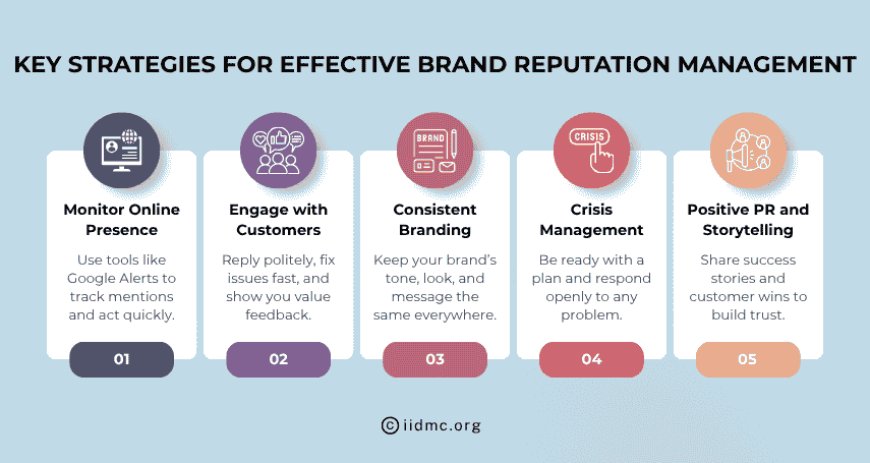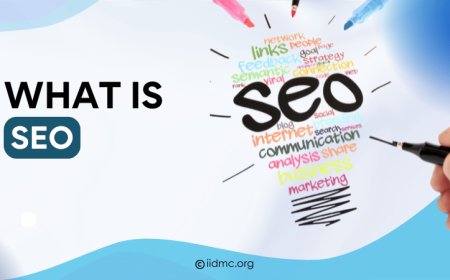Why Brand Reputation Management Is Important for Startups
Learn why brand reputation management is important for startups to build trust, attract customers, and grow their business successfully.

Have you ever chosen a product or service just because of what people said about the brand online? People often trust reviews, ratings, and social media more than advertisements. For startups, this makes brand reputation very important, as it can decide whether the business grows quickly or faces challenges in the early stages.
Brand Reputation Management means actively taking care of how your brand is seen by others. For startups, it’s not just about avoiding negative feedback; it’s about building trust, creating a positive image, and using every interaction to improve credibility. A strong reputation helps attract customers, investors, and skilled employees, giving your startup a strong base to succeed.
What is Brand Reputation Management?
Brand Reputation Management is more than just reacting to negative reviews. It is about actively shaping and protecting your brand’s image. For startups, this is especially important because first impressions often stick.
Key aspects include:
-
Customer Perception: How people feel about your brand shapes their buying decisions. Every interaction—through emails, websites, or social media—affects perception.
-
Online Reviews: Positive reviews build trust, while negative reviews can harm growth if not addressed. Platforms like Google, Yelp, or app stores are influential for startups.
-
Media Coverage: Mentions in blogs, news, or publications increase credibility. Negative press can quickly damage trust if unmanaged.
-
Social Media Presence: Social platforms amplify opinions about your brand. Engaging positively can strengthen reputation, while neglect or poor communication can harm it.
Why Startups Need Brand Reputation Management
Startups are new players in competitive markets. Reputation can directly influence their survival and growth. Here’s why it’s essential:
-
Builds Customer Trust: Potential customers rely on reviews and feedback. A positive reputation increases confidence in choosing your startup.
-
Attracts Investors: Investors evaluate the reliability and credibility of a startup. A strong reputation increases the likelihood of funding.
-
Supports Recruitment: Talented professionals prefer startups with positive public perception and trustworthy leadership.
-
Competitive Advantage: In crowded markets, a trusted brand stands out, even against competitors with better features or lower prices.
Common Reputation Challenges Faced by Startups
Startups often face unique challenges when managing reputation:
-
Negative Online Reviews: A single bad review can spread quickly and discourage potential customers.
-
Limited Brand Awareness: Being new in the market means every customer interaction is highly influential.
-
Inconsistent Messaging: Conflicting messages across website, social media, or advertising can confuse customers.
-
Social Media Backlash: Negative comments or viral posts can harm the startup’s image if not addressed properly.
-
Limited Resources: Many startups lack dedicated PR or customer support teams to manage reputation professionally.
Key Strategies for Effective Brand Reputation Management
Startups can use practical strategies to protect and improve their reputation:
-
Monitor Online Presence: Track mentions, reviews, and social media discussions using tools like Google Alerts or Brand24. Early detection allows quick action.
-
Engage with Customers: Respond politely to feedback, solve complaints promptly, and show customers that their opinions matter.
-
Consistent Branding: Maintain uniform messaging, tone, and visuals across all platforms. Inconsistency confuses customers and reduces trust.
-
Crisis Management: Have a plan for potential problems like product defects or PR crises. Quick, transparent communication can prevent long-term damage.
-
Positive PR and Storytelling: Share success stories, customer testimonials, or milestones. Positive stories often reach more people than paid advertising.

Tools to Strengthen Brand Reputation Management
Even with limited resources, startups can use tools to simplify reputation management:
-
Social Listening Tools: Hootsuite, Brand24, Mention help track online conversations about your brand.
-
Review Management Platforms: Google My Business, Yelp allow you to monitor reviews and respond promptly.
-
Customer Feedback Tools: SurveyMonkey, Typeform, or CRM platforms help collect and analyze customer opinions.
Using these tools ensures startups can detect and address reputation issues quickly and maintain a positive brand image.
The Role of Social Media in Brand Reputation Management
Social media is a powerful tool that can significantly shape a startup’s reputation, both positively and negatively. It allows startups to interact directly with customers, create awareness, and build a community around their brand.
-
Positive Engagement: Sharing updates about your products, celebrating milestones, posting customer success stories, and answering questions quickly creates trust and loyalty. Engaged customers often become advocates for your brand, spreading positive word-of-mouth.
-
Negative Feedback: Complaints, criticisms, or viral negative posts can harm your brand’s image if ignored. Promptly addressing these issues professionally shows that your startup cares about its customers and takes responsibility.
-
Best Practices:
-
Post consistently to maintain visibility and relevance.
-
Keep your brand voice consistent across platforms.
-
Avoid reacting emotionally to criticism; respond calmly and factually.
-
Address complaints promptly and publicly when appropriate, while offering solutions privately.
-
Use social media to educate, inform, and engage—not just promote your products.
Measuring the Success of Brand Reputation Management
Tracking metrics is essential to understand the effectiveness of your Brand Reputation Management efforts. This helps startups identify strengths, weaknesses, and areas for improvement.
-
Customer Reviews and Ratings: Positive reviews indicate customer trust and satisfaction, while negative reviews reveal pain points that need attention. Actively requesting reviews after service or product delivery can help maintain a steady stream of feedback.
-
Net Promoter Score (NPS): This score measures how likely your customers are to recommend your brand to others. A high NPS reflects strong customer loyalty and a positive brand image.
-
Social Mentions and Sentiment Analysis: Tracking mentions, hashtags, and discussions online shows how people feel about your brand—whether opinions are positive, neutral, or negative. This can guide marketing and engagement strategies.
-
Engagement Rates: Likes, shares, comments, and retweets indicate public interest and perception. Higher engagement usually reflects active customer involvement and approval.
Common Mistakes in Brand Reputation Management
Many startups unknowingly damage their reputation by making common mistakes. Recognizing and avoiding these mistakes is essential:
-
Ignoring Customer Feedback or Complaints: Customers expect to be heard. Neglecting their concerns can escalate issues and lead to negative reviews or social media backlash.
-
Overpromising and Underdelivering: Setting unrealistic expectations can disappoint customers, harming your credibility. Always communicate what your product or service can genuinely deliver.
-
Reacting Emotionally to Negative Reviews: Responding defensively or angrily can worsen the situation. A calm, professional approach reassures customers and protects your brand image.
-
Inconsistent Messaging Across Channels: Conflicting information on your website, social media, emails, or campaigns can confuse customers and reduce trust.
Benefits of Strong Brand Reputation Management for Startups
Maintaining a strong reputation provides startups with significant advantages, both immediate and long-term:
-
Customer Loyalty: Satisfied customers are more likely to return and recommend your brand to others, creating a loyal customer base.
-
Increased Visibility: Positive reviews, social media mentions, and word-of-mouth help new customers discover your startup more easily.
-
Business Growth: A strong reputation opens doors for partnerships, collaborations, and funding opportunities. Investors and collaborators prefer trustworthy and credible startups.
-
Long-Term Sustainability: A good reputation helps startups navigate market changes, competition, and challenges more effectively. It provides a foundation for growth that is more resilient to setbacks.
Steps to Start Your Brand Reputation Management Plan
Building and maintaining a good reputation requires a structured approach. Startups can follow these steps:
-
Audit Current Reputation: Examine online reviews, social media mentions, press coverage, and customer feedback to understand how your brand is currently perceived.
-
Set Clear Goals: Define how you want your brand to be perceived by customers, investors, and the public. Identify key metrics to track progress.
-
Implement Strategies: Monitor mentions, actively engage with customers, respond to feedback, and highlight positive stories or achievements.
-
Review Regularly: Track metrics, analyze trends, and refine your strategies over time. Adjust messaging or approaches based on customer sentiment and feedback.
How to Get Certified as a Brand Reputation Management Specialist
If you want to become a professional in managing brand reputation, getting a certification can help you gain credibility and practical skills. A Certified Brand Reputation Management Specialist focuses on building, maintaining, and improving a brand’s image, both online and offline. This role is highly valuable for startups, businesses, and digital marketing agencies.
Step 1: Choose the Right Certification
The first step is to select a trusted certification program. IIDMC (International Institute of Digital Marketing Certification) offers specialized courses that cover all aspects of brand reputation management. The course is designed for beginners as well as professionals who want to enhance their skills.
Step 2: Enroll in the IIDMC Program
Once you decide on IIDMC, you can enroll online. The program usually includes:
-
Introduction to Brand Reputation Management: Understanding why it is important for businesses and startups.
-
Online Reputation Management Techniques: Managing reviews, social media mentions, and search engine results.
-
Customer Engagement Strategies: How to interact with customers to improve brand perception.
-
Crisis Management: Handling negative publicity, complaints, or social media backlash professionally.
-
Measurement and Analytics: Learning to track metrics, sentiment analysis, and performance indicators.
The program is structured with easy-to-follow modules, real-life examples, and practical assignments to ensure you understand and can apply the concepts.
Step 3: Complete the Course
After enrolling, you need to complete all the course modules. IIDMC courses are flexible and can be completed at your own pace, making it suitable for working professionals or students. The program often includes quizzes, case studies, and practical tasks to help you apply your knowledge in real-world situations.
Step 4: Pass the Assessment
To earn your certification, you will need to pass the final assessment. The test evaluates your understanding of brand reputation management strategies, tools, and practical applications. Once you successfully pass, you receive an official IIDMC certificate as a Brand Reputation Management Specialist.
Step 5: Apply Your Skills Professionally
After certification, you can work as a Brand Reputation Management Specialist in startups, agencies, or large companies. You can manage online reviews, social media strategies, PR campaigns, and customer engagement to help businesses grow their brand image.
Why Choose IIDMC?
Choosing IIDMC for your certification comes with many advantages:
-
Global Recognition: IIDMC is an internationally recognized institute for Digital Marketing certification, adding credibility to your skills worldwide.
-
Comprehensive Curriculum: Covers all aspects of digital marketing and brand reputation management in detail.
-
Practical Approach: Focuses on real-world scenarios and tools used by industry professionals.
-
Flexible Learning: Learn online at your own pace without interrupting your work or studies.
-
Career Opportunities: Certification from IIDMC can enhance job prospects in digital marketing, PR, social media management, and brand consulting.
A strong brand reputation is crucial for startups because it builds trust with customers, attracts investors, and helps in recruiting talented employees. Managing your brand’s image carefully ensures that positive feedback spreads while negative issues are handled quickly. Startups with good reputations stand out in competitive markets and gain customer loyalty faster. Consistent engagement, transparency, and responsiveness strengthen credibility over time. Even small, ongoing efforts can have a big impact on growth and success. Ultimately, brand reputation management lays the foundation for long-term sustainability and business growth.





























